“It’s been a surreal experience. Thanks to Netflix I get messages from people all over the world saying they want to come to London and try my food.”
With international success, innovative cuisine, and the dream to someday be a judge on the Great British Menu, Ed Farrell from The Duck Truck knows how to aim high. We recently sat down with Ed to discuss the trials, tribulations, and triumphs of running a successful food business.
Ed and The Duck Truck have been going for nearly 10 years, though his love for ducks first blossomed in his childhood with his pet duck Quackers. Whilst Quackers unfortunately flew away never to be seen again, Ed has enjoyed similar soaring heights of success having opened a permanent location at Spitalfields Market and appeared on Countryfile and Million Pound Menu. More than at home in the food industry, Ed’s background in product and process development gave him the best grounding to start his own business. From there, he went on to work on a duck farm, eating duck every day (a habit he still tries to maintain) and gaining a true passion for the meat that he feels has “incredible potential” though sadly remains “really unknown and underused in the UK.”
Ed always wanted to be his own boss and continually came up with new ideas. “It was around 2010 or 2011 that I read Richard Johnson’s ‘Street Food Revolution’ and it really inspired me.” Reading about the growing street food truck culture in America gave Ed the idea to do something similar, so he bought a tent and “that is where it all began.” It was in 2012 that The Duck Truck’s popularity began to grow as Ed started doing events, however, as he will admit, he knew nothing about the industry. “That’s when I discovered NCASS” and it was through using the Event Guide that he could begin to plan and apply for events. His subsequent success ensures that, to this day, he “always recommends NCASS as people’s first port of call when starting out.” The first year of events was quiet but through positive recommendations and word of mouth, The Duck Truck began to get invitations to larger events.
As their popularity grew, Ed came up against unexpected reproductions of his idea. “We were one of the first of its kind in the UK and because it was such a unique idea there were a lot of imitations.” These traders would have the exact same product, menu and look as The Duck Truck and simply change the name as “that’s the only thing you can protect.” Though challenging at first, Ed decided to turn this situation to his advantage and recognize that imitation is indeed the highest form of flattery! He had a good idea that was clearly inspiring a lot of people. In response, Ed decided to start selling franchises and bring eager people onboard since he couldn’t do every event that he wanted to on his own. Unsurprisingly, he had a lot of interest but “it’s a complex and risky process as you’re giving people your brand.” Trust and passion were therefore integral, and Ed was able to sell two franchises, one which unfortunately didn’t survive Covid and another in Norfolk which continues to provide an exemplary service and cover many events for him.
“It can be hard to find good permanent locations” and Ed has been keen to avoid situations in which he has to set-up every morning and pack-up each night. His permanent food truck has been set up in Spitalfields Market for nearly seven years and though it has had its challenges, it has been incredible for his business and the new, post-Covid, boom is a promising taste of what is to come. Prior to Covid, Ed’s plan was to have small kitchens in various food halls, alongside his restaurants in Kings Cross and Cambridge. However, like many others, his restaurants didn’t survive the financial hardships brought about by the pandemic and Ed has decided to consolidate his goals and focus on having a good, festival packed, summer in order to revitalize the business. Though Ed has a complex relationship with festivals, he concedes that “it’s good business.” In fact, the Duck Truck is in for a busy summer with appearances at El Dorado, Glastonbury, Secret Garden Party, Boomtown and Lost Village, amongst others.
“They can be very enjoyable and have a great atmosphere,” but they’re also “a lot of hard work, long hours, risk, prep and money up front.” There is an assumption, Ed feels, that festivals are easy and lucrative, and consumers can easily think that a caterer is successful based solely off the long queues they see in front of a truck or stall. However, the reality for many vendors is long 15-hour days, the unavoidable risk of having large amounts of cash on hand and incredibly tight profit margins. That’s why working with festivals that know what they are doing is so important to Ed. “The organisers of Lost Village are really nice to work with and you don’t get that with many festivals at all.” Glastonbury too, “treat you really well and you have everything that you need.” When we asked him what festival organisers could do to help vendors, Ed shared that it’s important for them to understand that “all we want is a fair shot at it.” “When you are being asked for significant percentages of your gross turnover, it’s as though you are being asked to work for free.”
Add onto that, the cost-of-living crisis and growing concerns that Britain is facing another recession, and unsurprisingly Ed has concerns that the public won’t be willing to spend money in the ways that they have in the past. To make matters worse, the increasing cost of supplies creates a knock-on effect that unfortunately has to be passed onto the consumer, something that Ed wants consumers to know is out of necessity. “Duck prices went up by £10 a case this week alone” and even though it’s the supplier increasing the cost without explanation, it’s Ed and his staff, who must explain to customers why their prices are going up. Ed has faced several financial difficulties, still his frankness and honesty about these situations highlight his perseverance and resilience. In December 2021, after the nation was once again asked to work from home, The Duck Truck’s turnover vanished overnight. “We’ve had serious insolvency problems and were very close to folding after the announcement.” Covid debts, the increase in VAT and weekly supply price changes have created added pressure, but Ed is determined to succeed and acknowledges that “hard work and staying open” is the only way that The Duck Truck can survive.
An integral part of this survival is having a reliable team. It can be hard to find the right people because “it’s really tough work you’re asking these guys to do.” “It’s generally low pay, the hours are irregular and unsociable and there are so many other jobs they can switch to if they are unhappy.” But, once you find good staff, keeping them well paid, motivated, having fun and working hard, creates a trustworthy team that can take the headache out of staffing. Thankfully, Ed has succeeded in securing a strong core team that come back to The Duck Truck each year.
Undeniably, there have been a few painful lessons along the way, including having £15k in cash stolen whilst working at a festival. “It was horrendous, but a good lesson” and undoubtedly a key factor behind Ed’s preference cashless options. Thankfully, not all the lessons have been so grueling, and Ed’s background remains an invaluable asset. We asked Ed why a good relationship with suppliers was so important, and he shared that “the supply chain is essential” to his business. His experience in the food industry ensures that he has always been aware of the significance of a strong, fully integrated supply chain. “That’s how I built my business from the start,” to buy large quantities of produce directly from farms and manufacturers, utilizing his own frozen storage in his own warehouse. “It cuts out the middleman” and by doing the logistics himself, Ed can make a huge difference. “You need the necessary facilities and storage, but if you can do it, it can save a lot of money.”
As someone who works in the industry, can you share with our readers a few of your favourite places to eat? “The Clove Club and Restaurant Story are my favourite high enders and for cheaper eats I love The Little Taparia in Tooting, South London. It’s good food, good wine, and great value for money.”
And his advice for businesses getting ready for Summer: “Don’t be scared of Glastonbury, don’t be scared to ask for advice. Caterers are a community and often willing to help each other out. If you really want to do it and have a really good product, then do it.”
You can follow The Duck Truck’s journey here and read other member spotlights here.




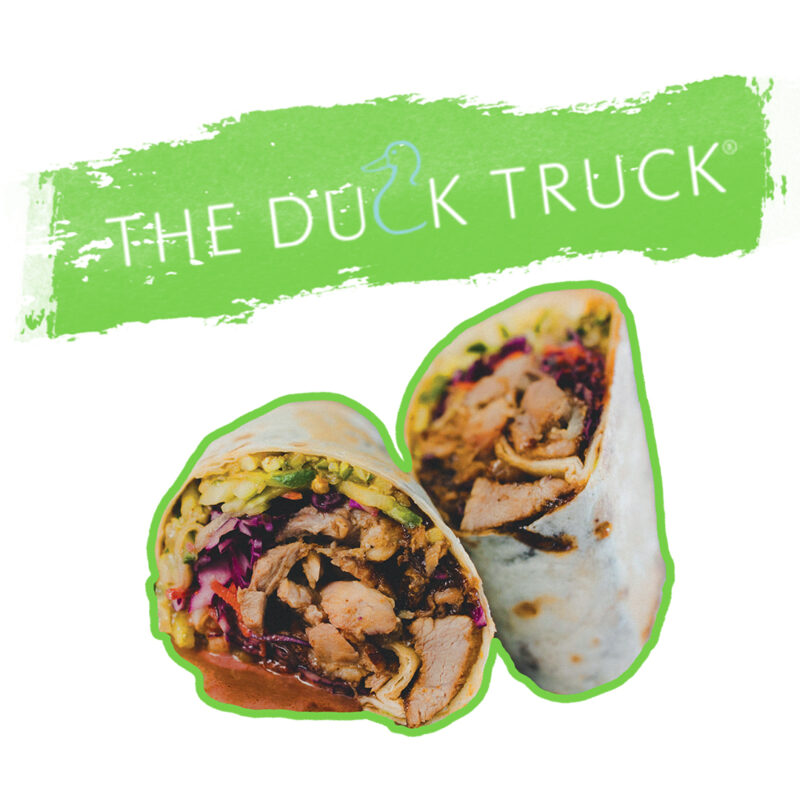
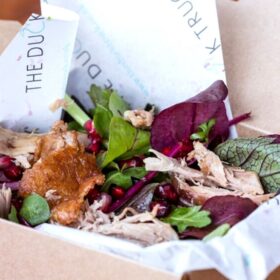
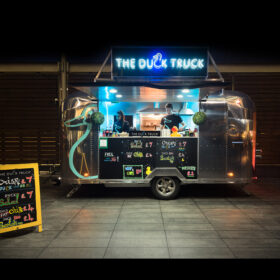
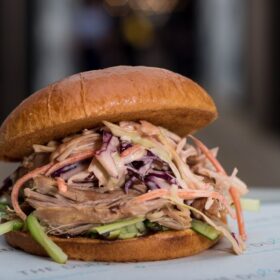
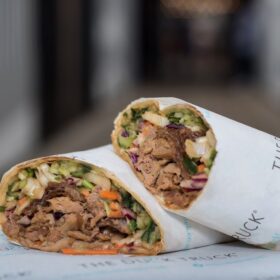
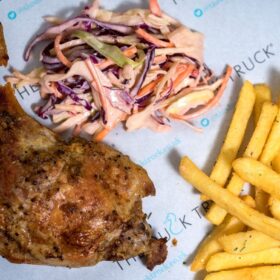

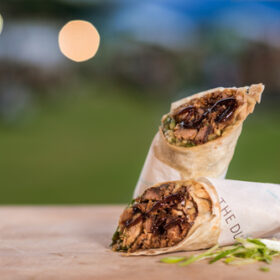
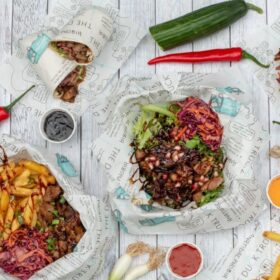
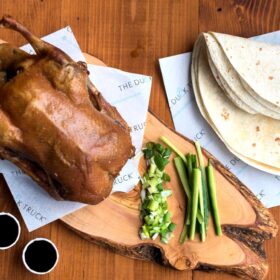

 Featured Training
Featured Training
OUR MEMBERSHIP
We're here to help make your catering business a success. Whether that be starting up or getting on top of your compliance and marketing. We're here to help you succeed.
Want our latest content?
Subscribe to our mailing list and get weekly insights, resources and articles for free
Get the emails